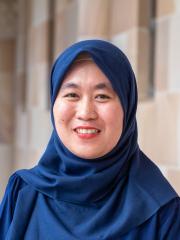
Acid Mine Drainage Passive Treatment Method Using Biofilms and Hyperaccumulator Plants for Post-Mining Rehabilitation
Active treatments widely implemented by the mining industry to manage Acid Mine Drainage (AMD) are not suitable for long-term solutions, particularly during the post-mining period where financial and human resources for treating AMD will not be as readily available as during the operational period. AMD treatment using passive methods, e.g., phytoremediation, can be a favorable alternative to overcome these challenges. My research aims to determine the potential ecological and environmental benefits of biofilms and hyperaccumulator plants to address two main features of AMD: low pH values and high concentrations of heavy metals.
Biography
Adithyanti obtained her bachelor's and master's degree in environmental engineering from Institut Teknologi Bandung in Indonesia. After graduating, she worked for the Ministry of Energy and Mineral Resources, the Republic of Indonesia from 2014 until 2023. Her responsibilities included overseeing the implementation of environmental management efforts and post-mining rehabilitation programs on mine sites throughout Indonesia. Her educational background and work experience has motivated her to further her education with mining wastewater treatment as her research interest. In 2021, Adithyanti was awarded a fully funded scholarship from the Indonesia Endowment Fund for Education (LPDP Scholarship) to pursue her PhD with the Sustainable Minerals Institute, The University of Queensland.
Industry
While working for the Ministry of Energy and Mineral Resources, Adithyanti has worked with stakeholders in the mining sector including industry representatives, academia, and non-government organizations in developing and giving technical guidelines on environmental management best practices for mining companies in Indonesia.
Funding
Indonesia Endowment Fund for Education Scholarship (fully funded scholarship from the Government of the Republic of Indonesia)
